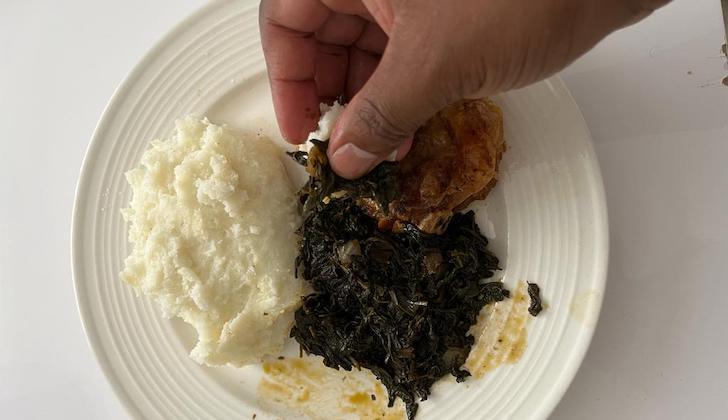Opinion / Columnist
Africans must stop eating Sadza; Here is why
30 Jul 2023 at 16:50hrs |
111 Views

Sadza is a staple food across much of Africa, particularly in Southern and East African countries. Made from ground cornmeal or cassava flour and boiled to a thick porridge consistency, sadza is a filling and affordable carbohydrate that has long sustained many African communities. However, as obesity, diabetes, and malnutrition increase across the continent, it may be time for Africa to rethink its dependence on sadza and evolve its food culture.
Sadza is nutritionally imbalanced. While it provides needed carbohydrates and calories, sadza is low in nutrients like protein, vitamins, and minerals. For many Africans who eat sadza with little other food, this lack of nutritional balance can lead to deficiencies and malnutrition. A diet heavy in sadza also tends to be low in fiber, which is important for digestive and cardiovascular health.
Sadza promotes overeating. The thick, bland texture of sadza makes it easy to overeat without realizing it. When sadza becomes the center of every meal, people tend to consume more calories than needed without feeling full. This caloric excess contributes to Africa's rising rates of obesity and weight-related diseases.
Sadza lacks variety. For many Africans, sadza has been a constant at every meal for generations. While familiarity can promote comfort, a lack of variety in the diet can lead to boredom and nutritional inadequacy. Moving beyond sadza to incorporate more vegetables, legumes, fruits, and whole grains would provide more essential nutrients and flavours.
Reforming food culture takes time but brings benefits. While sadza has sustained Africans for centuries, adapting food culture to new health needs requires shifts that may at first feel unfamiliar or uncomfortable. However, the benefits of a more balanced and varied diet could ultimately reduce diseases, improve nutrition, and support long-term wellbeing for millions across the continent.
Sadza will likely remain part of African food heritage for the foreseeable future. But considering Africa's nutrition and health needs today, it may be an ideal time for African communities and leaders to begin a respectful conversation about adjusting - not abandoning - their carbohydrate staple to support wellbeing for generations to come.
Sadza is nutritionally imbalanced. While it provides needed carbohydrates and calories, sadza is low in nutrients like protein, vitamins, and minerals. For many Africans who eat sadza with little other food, this lack of nutritional balance can lead to deficiencies and malnutrition. A diet heavy in sadza also tends to be low in fiber, which is important for digestive and cardiovascular health.
Sadza promotes overeating. The thick, bland texture of sadza makes it easy to overeat without realizing it. When sadza becomes the center of every meal, people tend to consume more calories than needed without feeling full. This caloric excess contributes to Africa's rising rates of obesity and weight-related diseases.
Sadza lacks variety. For many Africans, sadza has been a constant at every meal for generations. While familiarity can promote comfort, a lack of variety in the diet can lead to boredom and nutritional inadequacy. Moving beyond sadza to incorporate more vegetables, legumes, fruits, and whole grains would provide more essential nutrients and flavours.
Reforming food culture takes time but brings benefits. While sadza has sustained Africans for centuries, adapting food culture to new health needs requires shifts that may at first feel unfamiliar or uncomfortable. However, the benefits of a more balanced and varied diet could ultimately reduce diseases, improve nutrition, and support long-term wellbeing for millions across the continent.
Sadza will likely remain part of African food heritage for the foreseeable future. But considering Africa's nutrition and health needs today, it may be an ideal time for African communities and leaders to begin a respectful conversation about adjusting - not abandoning - their carbohydrate staple to support wellbeing for generations to come.
Source - Erick Matotoba
All articles and letters published on Bulawayo24 have been independently written by members of Bulawayo24's community. The views of users published on Bulawayo24 are therefore their own and do not necessarily represent the views of Bulawayo24. Bulawayo24 editors also reserve the right to edit or delete any and all comments received.
Join the discussion
Loading comments…


























